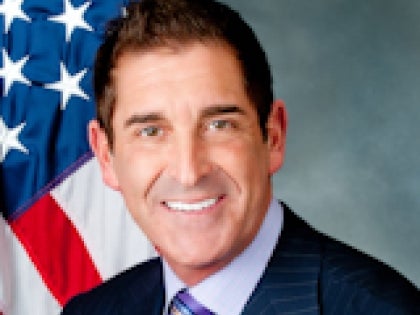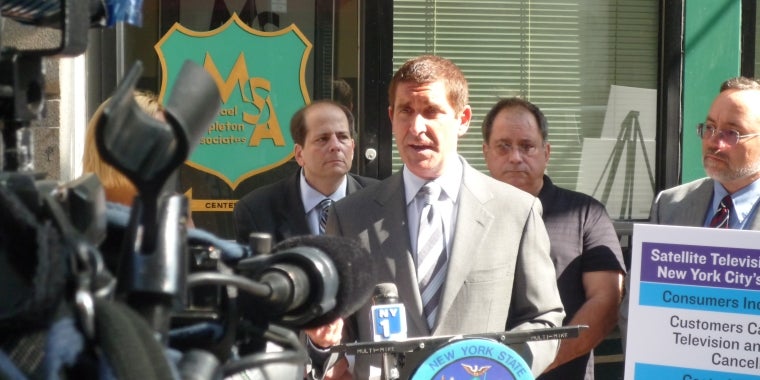
No More Fine Print
Jeffrey D. Klein
September 29, 2009
-
ISSUE:
- Consumer Protection

“NO MORE FINE PRINT”
Klein and Benedetto Expose Deceptive Consumer Practices by DirecTV and Unveil Legislation Calling for more Transparency and Disclosure in Marketing
NEW YORK- Senator Jeffrey D. Klein (D-Bronx/Westchester), Assemblyman Michael Benedetto (D-82nd District) , former DirecTV customers John Irving and Jeffrey Kirsch, New York Public Interest Research Group (NYPIRG) Consumer Attorney Tracy Shelton and Consumers Union Program Director Chuck Bell exposed deceptive practices engaged in by DirecTV, a Satellite Television Service and called for legislation that would create more transparency and disclosure in marketing practices by cable and satellite companies.
Klein became involved with this issue last March after former DirecTV customer John Irving contacted the Senator’s office, saying DirecTV was charging him $178.66 in Early Cancellation Fees (ECFs) also known as Early Termination Fees (ETFs). Initially, he said the fee was more than $400 dollars but after multiple discussions with the company, Irving argued the fee down. Irving called DirecTV asking why he was charged an ECF and the company told him when it replaced a broken receiver five different times, each time his contract was renewed two years. Irving had no idea his contract would be renewed and claimed he was never informed about the ECF policy.
“I think DirecTV’s practices are deceptive. In my case, at one point they claimed I owed $440 which I demanded they bring down. I agree with Klein’s bill in that all fee and contract information should be clear and up front, not just for DirectTV but for all cable, cell phone and satellite companies,” said Irving.
“DirecTV is leaving too many innocent customers in the dark. The small print on its ads is confusing and misleading. As a supporter of consumer rights and protections, I aim to put an end to these deceptive practices and mandate all satellite and cable companies fully disclose all fee and contract renewal information,” said Klein. “I am not here to tell consumers what’s the better deal. I am here to make sure consumers have all of the information they need when choosing a service.”
"For far too long consumers have been subject to the 'got-ya clause' that certain companies insert, in small print, into contracts. This is a practice that must stop and this is an effort to do just that," said Assemblyman Benedetto.
Jeffrey Kirsch is another former DirecTV customer and a resident of Long Island who also claims he was never notified about ECFs and contract renewals when the company replaced his broken receiver.
“DirectTV’s policy was not made known and was unconscionable even if it was known. Imagine, a 14 year customer has to have a broken receiver replaced, and without his knowledge he is now classified as a new customer and has $300 debited from his bank account without notice when he changes to a different service. Sen. Klein’s legislation will protect others from this reprehensible practice that most people were unable to fight,” said Kirsch.
Kirsch and Irving’s experiences are hardly unique. The Better Business Bureau recently changed DirecTV’s rating from a C- grade to No Rating (NR), meaning the bureau has received so many complaints, DirecTV’s grade is below F. Nationwide, the BBB received more than 20,000 complaints in the past three years regarding DirecTV early cancellation fees. In comparison, the BBB gave competitor Time Warner an A+ grade, and Cablevision an A grade.
Klein’s Senate bill, carried by Assemblyman Benedetto in the Assembly, would require cable and satellite companies to disclose early cancellation fees in a clear manner so they are made visible and known to consumers.
“This should mean the end to ‘stealth termination fees’ in pay TV contracts,” said Tracy Shelton, Consumer Attorney with the New York Public Interest Research Group (NYPIRG). “Early termination fees are anti-competitive and designed to coerce consumers into staying with what may be for them a lousy or overpriced service provider and unfairly punishing them if they want to switch companies. Senator Klein’s bill will protect New York consumers and promote real price and service quality competition in the subscriber television marketplace.”
Klein’s bill (S6182) would eliminate the small print for fees, requiring companies to present early cancellation fees with the same prominence as the sales price for programming when a contract is initiated or renewed. The bill states companies must inform consumers about the fee in any solicitation before the service is sold. Additionally, companies not following these disclosure requirements will be stripped of their ability to levy early cancellation fees, and subject to penalties relevant to deceptive practices under the general business law of New York State.
“Getting stuck with a big ‘gotcha’ termination fee for telcom services is every consumer’s worst nightmare,” said Chuck Bell, programs director of Consumers Union, publisher of Consumer Reports. “In the case of DirecTV, consumers who accept equipment upgrades may not realize that they are extending the period they will be liable for termination fees. SB 6182 will help create a level playing field for all video service providers, and ensure that consumers get appropriate information about the nature and amount of any termination fees upfront when they agree to the transaction.”
In addition to burying cancellation fees in the fine print, every time DirecTV installs a new receiver for a customer, the company also renews the customer’s contract for another two years. Because this renewal policy is written in confusing, small print, customers have no idea their contract is getting renewed and if they cancel their subscription DirecTV imposes an early cancellation fee. The fee can cost up to $480. If the customer uses direct deposit to pay for his/her service, the fee is taken directly from his/her account. Every year, DirecTV profits up to twenty-two million dollars because of ECFs in the New York City Direct Market Area.
The bill has been introduced to the Senate Consumer Protection Committee.
* * *



